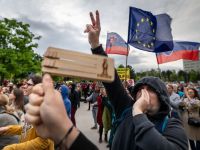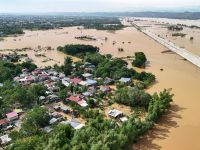The Islamic Jihad group is considering emulating its larger rival Hamas in ending suicide bomb attacks inside Israel, a senior official told AFP early Saturday as intra-Palestinian violence claimed six lives.
"The movement is thinking seriously about putting a stop to this military action against Israel because we are worried about Palestinian national unity," the official said, after six people died and 60 were wounded Friday in clashes between police and Islamic Jihad supporters at the Jabaliya refugee camp, north of Gaza City.
Both Islamic Jihad and Hamas have borne the brunt of Palestinian leader Yasser Arafat's crackdown on Islamic activists in December, which has seen some 180 persons arrested and more than 40 offices or charities with ties to the oranisations closed.
In a sign of the pressure's effect, the political wing of Hamas called for a halt to suicide bombings and mortar attacks against Israel, for the sake of "national unity."
The appeal was later accepted by the movement's armed wing, the Ezzedine al-Qassam Brigades, on condition however that Israel stops its assassinations targeting Palestinian activists.
Since mid-week, Gaza City has been the stage for heavy battles between Arafat's security forces and Islamic activists.
The worst Palestinian unrest in years marred Arafat's efforts to crack down on Islamists, while Israel and Washington urged him to do even more despite the truce announcement by Hamas.
Six Palestinians were killed when clashes erupted between Islamic activists and police following the funeral of a 17-year-old Islamic Jihad member in the Jabaliya refugee camp, hospital sources and witnesses said.
The teenager was killed Thursday during a gunbattle between Palestinian security forces and Hamas members, and witnesses said the clashes started when a group broke away from the procession to fire on a police station.
More than 60 others were also injured in the ensuing violence, they said.
The bloodshed came after Hamas, which has claimed the bulk of recent suicide attacks in Israel, called on its military wing to stop all suicide and mortar attacks against the Jewish state until further notice.
"This decision is to protect our Palestinian national union and to guard our way of struggle until we get our independence, although we know the Israeli occupation and its aggression policy will continue," the group said in a statement.
The announcement by the group's political wing came as a landmark in Arafat's efforts to crack down on Islamic activist, after a wave of suicide attacks in early December led to huge pressure on his Palestinian Authority.
Hamas' truce call drew a skeptical reaction from Israel, with a defence ministry spokesman saying the announcement would be judged "on the facts".
Yarden Vatikai pointed out that a senior Hamas figure, speaking on condition of anonymity, had said on Wednesday that the group would halt suicide operations, a claim later denied by a Hamas spokesman.
He added that the Palestinian Authority had still not done enough to crack down on Islamic groups, a view which was echoed by Israel's chief ally Washington.
The White House acknowledged that Arafat had taken "some positive steps", but spokesman Ari Fleischer added that "more is required to put an end to the terror attacks."
The Palestinian leadership hailed the Hamas decision.
In a statement issued after its weekly meeting and carried by the official WAFA agency, the leadership said Hamas' announcement "serves the national interest and foils (Israeli Prime Minister Ariel) Sharon's plan to sabotage the peace process and break the international consensus on the establishment of a Palestinian state with Jerusalem as its capital."
Hamas' move marked a thaw in ties between the two sides, which reached an all-time low in 15 months of hostilities last week when Sharon cut all ties with Arafat, accusing him of failing to prevent “extremist attacks.”
But Sharon himself ordered resumption of security talks, as Foreign Minister Shimon Peres said Israel was willing to relax its stranglehold around Palestinian cities if Palestinian police moved in and guaranteed the truce Arafat called for.
Top Palestinian negotiator Saeb Erakat also said Friday that Israel was continuing political contacts with the Palestinians, but did not specify at what level.
Arafat received a diplomatic boost from Arab League foreign ministers meeting in Cairo late Thursday when they expressed "support" for his decision to call for a halt to armed operations against Israel.
They also said they would "boycott" Sharon for his isolation of the beleaguered Arafat, but set aside calls to cut all ties with the Jewish state.
Arafat also got symbolic support from the UN General Assembly, which adopted a non-binding resolution calling for observers to be sent to the occupied Palestinian territories, a move slammed by the Jewish state and hailed by Palestinian officials. (AFP, Gaza)
© 2001 Al Bawaba (www.albawaba.com)







